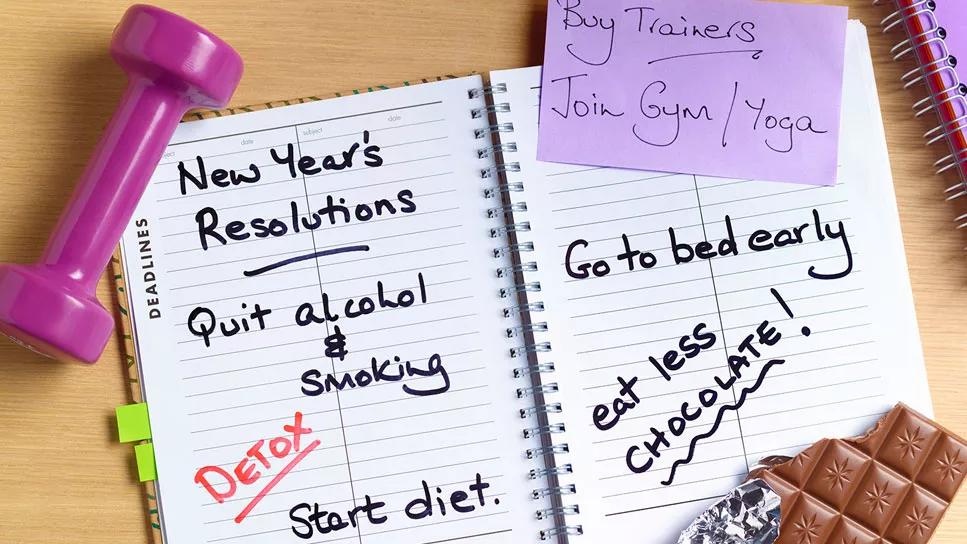Advertisement
Whether you’re trying to work out more, drink less or manage stress, we can help set you up for success

When the ball drops at midnight, you’ll still be ... well, you — but if something about the countdown to a new year inspires you to embrace a clean slate, you’re certainly not alone. An estimated 44% of Americans set New Year’s resolutions to try to adopt self-betterment at the turn of the calendar year.
Advertisement
Cleveland Clinic is a non-profit academic medical center. Advertising on our site helps support our mission. We do not endorse non-Cleveland Clinic products or services. Policy
But here’s the kicker: Come next December, only 55% of those people say they’ve been successful in achieving their start-of-the-year goal. What can you do to be sure you’re among them?
“Many of the behaviors linked to resolutions involve activities or habits that you’ve had for years,” says psychologist Susan Albers, PsyD. “Give yourself some time to adapt and make changes.”
Our experts weigh in on some of the most common New Year’s resolutions and how to set yourself up for success as you pursue each of them. Good luck — and Happy New Year!
This is a huge, broad category, and trying to overhaul your entire diet all at once is a surefire way to overwhelm yourself. Instead, narrow your focus and work on mastering a healthy habit like:
Once you’ve accomplished one goal, you can move on to the next — and feel confident in your ability to ace that one, too.
Need a little help? Seeing a dietitian is one of the best ways to make this the year you clean up your diet. As experts in food and nutrition, they can help you nail down nutrition basics and figure out what works best for you.
“Dietitians can help you sift through the misinformation, give you some fresh ideas and help provide accountability,” says registered dietitian Tegan Bissell, RD, LDN, CDCES.
There’s a reason why gyms are so packed at the start of the new year: Establishing an exercise routine is one of the most popular New Year’s resolutions there is. But if you’ve never been one for physical activity, or if you’ve fallen out of the habit, it can feel nearly impossible to begin.
Now sure how to start working out? Don’t go too hard too soon. “If you’re starting from zero, you need to set the bar low enough to be realistic,” says certified professional trainer Alena Beskur, CPT.
Advertisement
This will look different for everyone, depending on individual ability and activity level. Maybe taking a workout class will help you ease into things. Maybe you want to start a running regimen. Or maybe it means starting with core strength exercises, and then adding in other types of weight-training (like barbells) or resistance exercises (like pushups and sit-ups) to build muscle. You can even try hiring a personal trainer for a few sessions, just to figure out how to begin.
Whatever you decide, start small and ramp up your effort slowly. One of the best ways to motivate yourself to stick to your new exercise plan is to set smaller goals in pursuit of a larger one.
“You get the sense of accomplishment that reaffirms your efforts,” says exercise specialist Ben Kuharik, “and this can snowball into achieving even greater goals.”
Whether you’re starting the year with a Dry January, resolving to scale back on happy hours with friends or trying to stop drinking altogether, this common New Year’s resolution can feel incredibly daunting.
First, it’s important to understand your relationship with alcohol, says addiction psychiatrist David Streem, MD. If you’re living with alcohol use disorder (also known as alcoholism), drinking isn’t just a habit; it’s a medical condition.
“It may not be safe for someone with alcohol use disorder to stop drinking without professional support,” Dr. Streem says. A medical rehabilitation facility can best support you on your path to recovery.
But even if you’re an occasional or social drinker, examining your relationship to alcohol should still be your first step. Once you figure out why you drink, when you’re most likely to drink and how drinking makes you feel, you can formulate a plan that will help you scale back (or give it up entirely). This may include:
“At its core, quitting drinking is a behavioral change,” Dr. Streem adds. “It’s about breaking a habit and starting new habits.”
Advertisement
You deserve to feel less stressed and more chill in the new year. Because the world won’t magically stop turning and give you a quick break from all of your responsibilities, the key is learning to manage your stressors.
“While no one can avoid all stress, you can work to handle it in healthy ways that increase your potential to recover,” says clinical psychologist Adam Borland, PsyD.
A healthy diet, regular exercise and counseling can all help reduce stress — and so can relaxation techniques that teach you coping skills. Look into options like:
Self-care is an important piece of the equation, too — and it’s not about self-indulgent spa treatments and luxury vacations like you might think.
“Find an activity that promotes inner peace and calm,” says preventive medicine physician Sandra Darling, DO, MPH. “This will allow you to unwind from stress and get in touch with your needs.” Commit to experimenting with different self-care practices to see what works best for you.
Kicking your smoking habit is, hands down, one of the very best things you can do for your health — and it’s no easy feat. We’re proud of you for resolving to quit!
If you’ve tried to quit before, you may head into this resolution doubting your ability to make it stick this time. But pulmonologist Neha Solanki, MD, says one of the most important elements of quitting is to keep trying.
“It’s OK if you have to start over again,” she reassures. “A lot of people feel guilty about it. Relapsing doesn’t make you a failure.”
Advertisement
To set yourself up for success, first, create a plan to quit smoking. One of the best ways to do this is to make an appointment with a healthcare provider who can help you navigate choices like over-the-counter nicotine patches, lozenges and gums, as well as prescription options. They can also help you brace for withdrawal symptoms.
“Most people who smoke try three times before successfully quitting,” says pulmonologist Humberto Choi, MD. “Don’t give up. Even if you’ve smoked for your entire life, it is never too late to quit.”
If you’re on a first-name basis with the delivery guy, it may be time to resolve to get cookin’. To kick your takeout habit, stock up on easy-to-prepare freezer meals with healthy ingredients.
“One of the reasons we often go to food apps is because it’s convenient,” notes Dr. Albers. “If you have an option in the freezer or the refrigerator ready to go, you’re much more likely to reach for those options than the delivery buttons.”
Another habit worth adopting in the new year is meal prepping, which ensures that you always have healthy options on hand. Choose simple, well-rounded meals that don’t include a ton of ingredients, and then learn to plan ahead for grocery shopping.
The effects of working too much are real, and burnout is so common that the World Health Organization (WHO) has classified it as a syndrome resulting from “unmanaged workplace stress.” Achieving a work-life balance can take, well ... work — but it’s worth it.
“Besides an emergent situation such as saving someone’s life, nothing should come before your own health or relationships,” emphasizes psychologist Amy Sullivan, PsyD. She suggests putting physical distance between your personal and professional lives, especially if you work from home, by designating a special area for work.
You may also need to learn to:
Advertisement
Still, sometimes it’s not enough. If you’re dealing with a toxic work environment and nothing seems to be helping, this may be the year you decide it’s time to leave your job.
“It’s not worth your physical or psychological health or your important relationships [to stay],” Dr. Sullivan says.
You know the saying: “You can’t pour from an empty cup.” Focusing on your mental health can help make everything else in your life a little bit easier to manage.
There’s no cure-all, of course, but a combination of therapies, resources and lifestyle changes can work wonders for your mental health:
You can also take steps to improve your mental strength, aka your ability to cope with challenges, in a healthy way. Combining mental strength with good mental health can improve your quality of life and contribute to overall happiness.
“You can commit to learning about healthy coping strategies and practicing different ways of coping with stress,” says registered psychotherapist Natacha Duke, MA, RP. “It’s never too late to learn effective strategies.”
Learn more about our editorial process.
Advertisement

Integrating coping skills into your teen’s daily routine helps turn self-care into a lifelong healthy habit

Our collective misremembering of events comes from a surplus of false memories

This alternative brain-body therapy focuses on unlocking pent-up feelings, memories and tension that may be stuck in your brain and body

Exercising can actually improve arthritis symptoms — and low-impact exercises are best

This old trick for building habits can work, but you still need motivation, repetition and discipline to get results

Bulgarian split squats, hack squats and goblet squats are just a few of the moves you can try

While walking, be mindful of your body, your mind, your place in the world and all five of your senses as you pave a path forward, one step at a time

Squat smart with proper technique, including a neutral spine, wide knees and an engaged core

Focus on your body’s metabolic set point by eating healthy foods, making exercise a part of your routine and reducing stress

PFAS chemicals may make life easier — but they aren’t always so easy on the human body

While there’s little risk in trying this hair care treatment, there isn’t much science to back up the claims